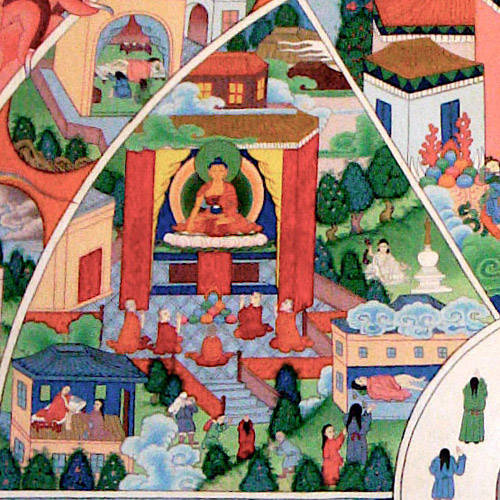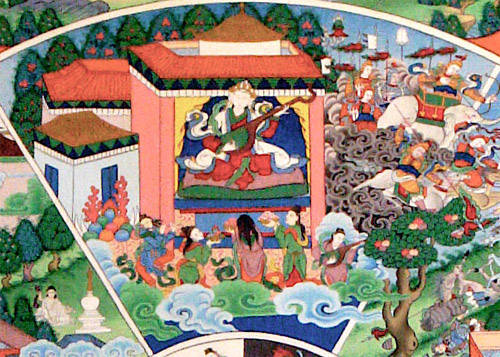The following is an excerpt from a teaching by Jetsunma Ahkon Lhamo called “The Habit of Bodhicitta”
We have been revolving in cyclic existence for literally aeons and all during that time, in some form or another, we have conceived the idea of self-nature. Our habit, then, is to hold the idea of self-nature as being very, very solid and very, very real. Our habit, absolutely from the get-go, is to distinguish between self and other. Our habit is to react toward other with hope and fear. Our habit is to think in that relative sense and that comparative sense. There is no compassion in any of that, and it’s not going to happen.
In order to truly develop compassion, we have to first get the idea and really take to heart the idea that the only thing blocking us from giving rise to the great bodhicitta, or great compassionate activity, is our habitual tendency. So no matter what we feel, if we have the stupid idea that we are good or bad (or whatever our ideas are about life if you have them), set them aside for a moment, and address the singularly important fact that you simply don’t have the habit of truly empathizing and having compassion for the condition of other sentient beings in any consistent and real sense. It’s a question of habit and not a question of good or bad. Are you able to feel compassion? Many students have come to me and said, ‘Well, I love the idea of compassion. I think it’s wonderful. I hope you are good at it. I hope you continue to teach it to others. But I just don’t really feel compassion for other people. So I don’t think I can be a Mahayana Buddhist.’ And, really, I cannot count on all of your fingers how many times it has happened to me that a person has said, ‘I love it, but it won’t work for me. I just don’t have any compassion.’
You can’t hide out in that any longer. That’s not a valid excuse, because the fact of the matter is that we are all in the same condition. No one here truly has the habit of compassion. Well, we have a little. Every now and then a jigger of compassion gets mixed into the cocktail of life. (Pretty cute, huh?) But in truth, we have very little. If we had a great deal of compassion, our whole lives would be given over to benefiting others. There would never be another choice. There would never be another choice. Everything that we do would come out as benefit to others. It would be like magic. You wouldn’t even have to think about it if you had really given rise to the bodhicitta and broken the habit of self-absorption. There would never be another option.
But that’s not the case for sentient beings. We are all in the same condition. So what we have to do is stop waiting to feel compassion, because you are always going to paint yourself into a corner with that one. You are never going to be satisfied with what you are feeling. Until enlightenment, we are never going to be satisfied with anything. So you can’t hide out in that excuse. You simply have to develop a new habit. Sometimes when you are developing that new habit, it can look like this: OK, it doesn’t so much matter what I want here. There are other people that want things in this room, and I’m going to give it up. It can look like that at first. That doesn’t mean that you’re not doing a good job; and it doesn’t mean that you are wrong. It doesn’t mean that you’re bad, and it doesn’t mean that you are a martyr either. It doesn’t mean that you are making an extremely valiant effort and should be rewarded. It doesn’t mean anything. It only means that you are developing a new habit, bit by bit.
Copyright © Jetsunma Ahkon Norbu Lhamo All rights reserved




